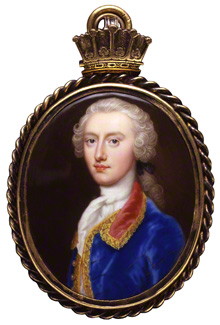“Employing every art and all the Address I am Master of”
That summer, Julien-Alexandre Achard de Bonvouloir, younger son of a French nobleman, and the Chevalier d’Amboise arrived in London on a ship from New England.
They aroused the suspicions of the British government. On 5 August John Pownall, Secretary to the Board of Trade, wrote to the Earl of Dartmouth, Secretary of State for the colonies:
The Lodgers at the Hotel in Watling Street have been watched & pumped by a discreet & proper person employed by Lord Rochford, they proved to be as stated in the Letter you left with me, French officers from the West Indies, by the way of North America; they do not conceal that they have been in [Israel] Putnams Camp, but they speak of him and his troops in a most despicable Light, and say that but for their advice they would have made an Attempt that would have ruined them—if this is true I don’t think we are much obliged to the Gentlemen—The Earl of Rochford (shown above) was Britain’s other Secretary of State, with responsibility for continental Europe.
they further say that there is at least 200 able Officers & Engineers of all countrys now here endeavouring to get passages to North America—
a few days ago the Society at the Hotel was increased by the addition of a french officer from France, who got out of his Chaise at Westminster Bridge took a Hackney Coach, and went both to the Spanish and French Embassadours—in a few days we shall probably know more and be able to judge what is fit to be done.
This document seems less valuable for its secondhand content about America than for its hints about intelligence methods in London. The Frenchmen were “watched,” “pumped,” and trailed. The new arrival switched vehicles before visiting embassies but didn’t manage to shake his trackers.
Lord Dartmouth’s files also contain a unsigned report headed “Intelligence.” which states:
What I have been able to collect from the two French Officers by employing every art and all the Address I am Master of, amounts to what follows:—I suspect the claim to have been “in person at the Affair of Lexington” meant Bonvouloir and D’Amboise were present in eastern Massachusetts during the militia alarm on 19 April, not that they were in Lexington itself on that early morning. Still, adding two aristocratic Frenchmen to the mix of people in New England at the outbreak of war is intriguing.
1st. That they have been over great part of the American Continent, particularly at Philadelphia, at New York, Rhode Island, and New England, which with their stay in and about Boston, would have required more time to perform than the three Months they say they remained in America.
2d. That they are particularly acquainted with Putnam and [Artemas] Ward,—the first they represent to be a good natured Civil and brave old Soldier—but a head strong, ignorant and stupid General—Ward they hold indeed very cheap.
[3d.] That they were both in person at the Affair of Lexington, and from circumstances they cited, I am induced to think that they were present at the Affair of the 17th [i.e., Bunker Hill].
4. That they were courted by the Rebels to stay amongst them, and were offered forty Pounds / Month each, of pay—they say they did not think such Offers solid, nor did they like the paper Currency. . . .
TOMORROW: Pumping M. Bonvouloir.




